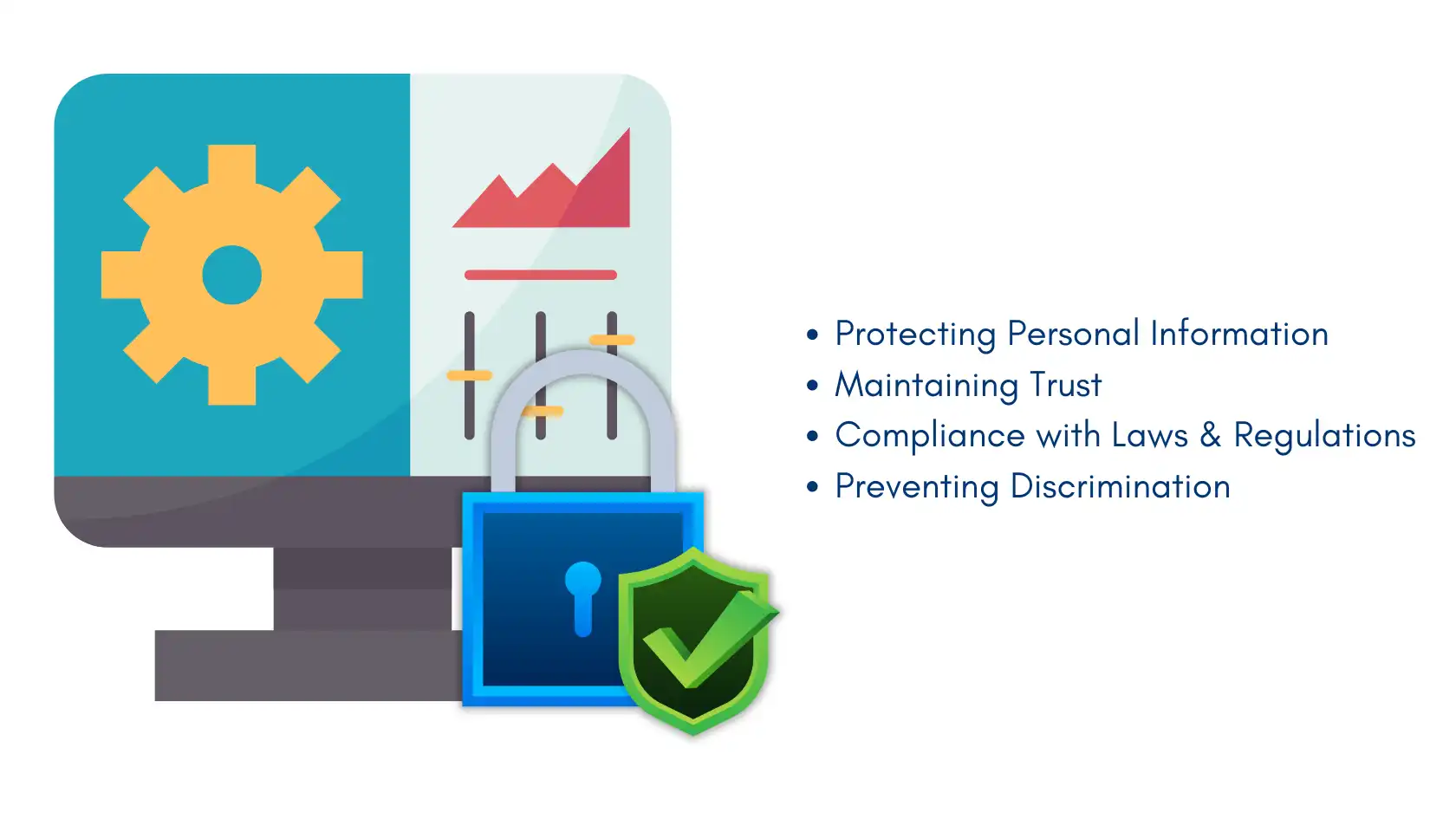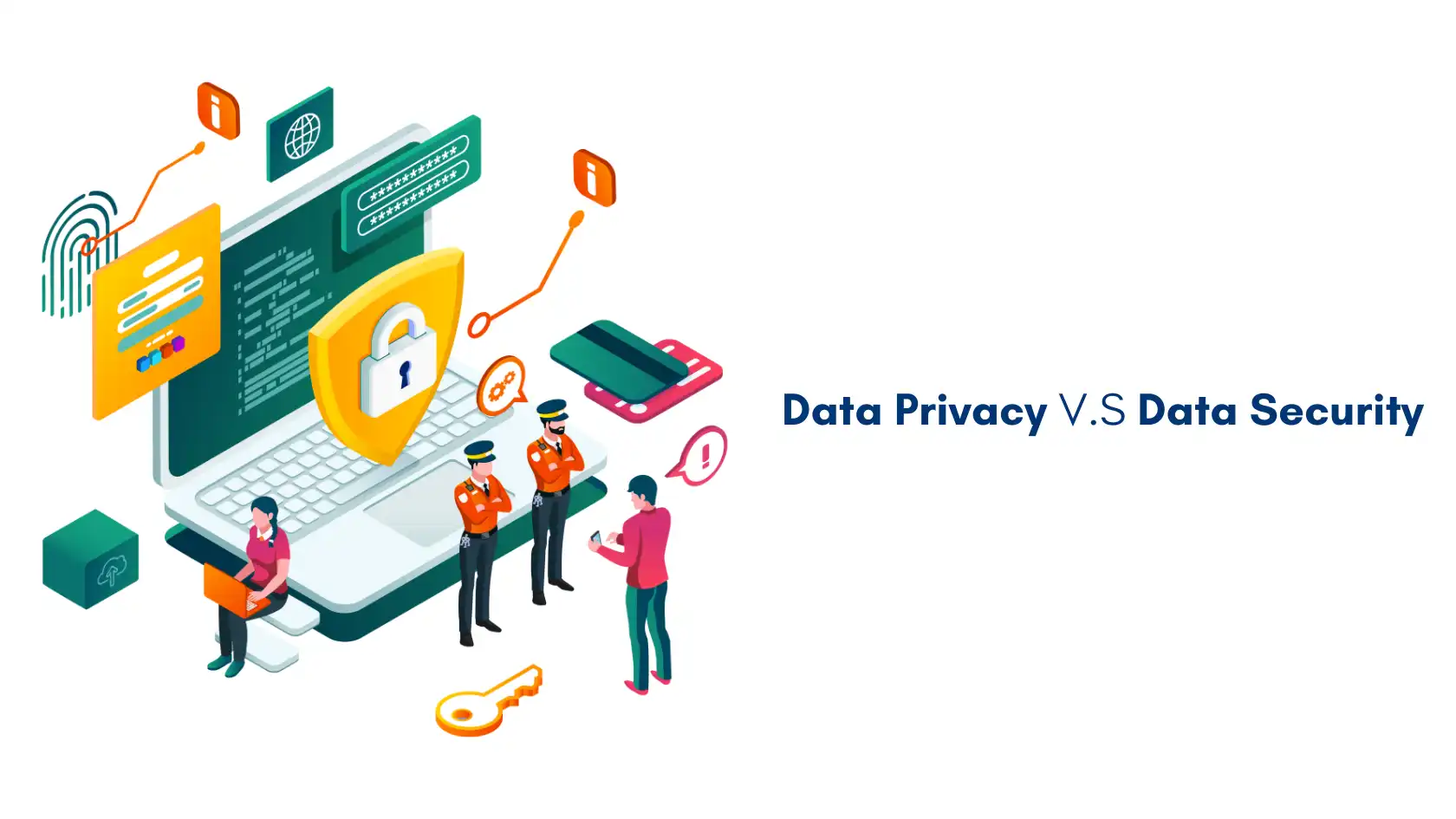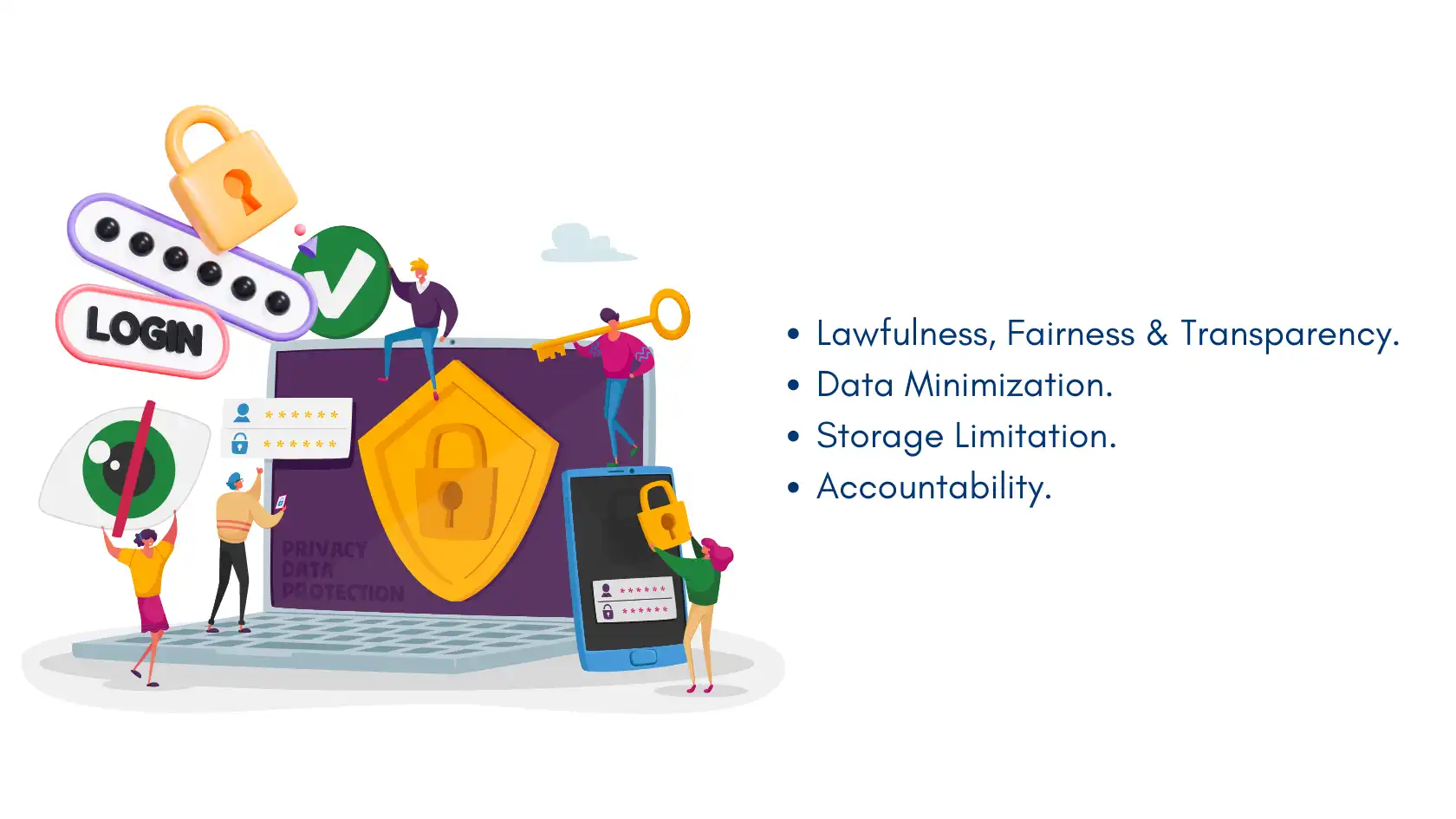What is data privacy?” We hear this question a lot and it is no surprise why. In today’s digital age, where our personal information is continuously being collected, stored and even shared.
It is more important than ever to understand what data privacy means and how to protect it.
Imagine your personal information like your name, address, phone number and even your online shopping habits are valuable treasures to others.
Data privacy is like the lock and key that keeps that treasure safe from nosy hackers. But it is not just about keeping your information hidden.
Data privacy is also about having control over your own data. It is about deciding who gets to see your treasure.
How they can use it and when they need to give it back.
Now, you might be thinking, “That is great, but how do I make sure that my data is actually being protected?”
Don’t worry, we have got you covered. Stick with us as we tell you about the ins and outs of data privacy.
Trust us, by the end of this, you will know everything.
What Is Data Privacy?
Data privacy or information privacy, is the area of data protection that deals with protecting personal and sensitive information from unauthorized access.
This refers to the rights and expectations a person should have in respect of how their data is being collected, stored and shared with others.
The amount of information that an organization can derive about individuals from the smartphone they carry to their privacy settings, online behavior and interests has made data protection more important than ever.
Ultimately, data privacy guarantees that people can take possession of their personal information while knowing who has it and how they are using or sharing the information.
Data privacy is maintained by governments and institutions that regulate it through laws and rules like the GDPR in Europe or CCPA, which imposes strict standards on how personal data should be used.
If we put it simply, data privacy safeguards your private information to be secure or properly processed and that sharing without consent does not take place.
How Important Is Data Privacy?

In an age where everything is digital, personal data is routinely collected and stored by various organizations from social media platforms to online retailers, that is what makes the importance of data privacy crucial. The significance of data privacy revolves around the following points:
Protecting Personal Information
First and foremost, data privacy is an issue of security; it protects all your personal information such as financial details, health records—you name it.
All the things going rogue under unauthorized channels highlight the importance of data privacy. If the privacy of anything you shared in your chat box has been compromised under any means.
It can be easily exploited by cybercriminals and used for identity theft, fraud, or other illegal activities.
Maintaining Trust
Companies who make data privacy a priority, become trustworthy by their customers.
People feel safer interacting with a company and providing their data if they believe it is being handled securely and ethically.
A violation of that trust can result in damage to your reputation and customer confidence and is likely to challenge consumer protections.
Compliance with Laws and Regulations
Data protection laws continue to be passed by governments which impose great constraints on the way in which data is processed, for example between GDPR in EU and CCPA law installed recently made effective within California.
These are the standards that force companies to safeguard people’s personal data and empower them around how these people own information is used. Failure to comply leads to big fines and even legal actions.
Preserving Individual Rights
Data privacy is a human right. It allows people to be the rulers of their own personal data like what should or should not flow and how it gets used. This is important particularly when it comes to avoiding corporate abuse or government surveillance.
Preventing Discrimination
Data privacy makes sensitive information such as race, religion or sexual orientation harder to be used stridently in order to treat people unequally.
Privacy is one of the tools that helps to make it harder for personal data to be exploited in ways harmful or marginalizing people.

- Lightning-fast speeds to browse without lag
- Servers in 105+ countries around the globe
- Military-grade security to stay safe online
- Try it risk-free with its money-back guarantee
- Native apps for all major devices
Data Privacy V.S. Data Security

Data Privacy and Data Security are related but different things as well, although they address the same angle of safeguarding data.
Given the importance of this difference, it is important for anyone wanting to protect their own private data and organizational data.
Data Privacy
Definition
It is the area focused on how an individual desires their information to be collected, stored and shared data.
Data governance is a collection of rules and processes that tell people how to use data in compliance with privacy laws and data owner approval.
Key Concerns
- Who has access to the data?
- How is its data collected, stored and even shared?
- What is the purpose of data collection?
- Are individuals opting in to sharing their data?
Examples
- Companies should request to use data.
- Meeting regulatory obligations, which could include the GDPR or CCPA.
Data Security
Definition
Data security refers to measures and tools used to protect data from unauthorized access, breaches or attacks.
It is designed to protect data against any threats and maintain the functions of both parties’ availability, integrity and confidentiality.
Key Concerns
- How is data prevented from unauthorized access or cyberattacks?
- Is there protection against data leaks?
- How is the data being secured through technologies and practices?
Examples
- Using encryption to protect data during transmission and storage.
- Using firewalls, antiviruses and IDSs (Intrusion Detection Systems).
The Relationship Between Data Privacy and Data Security
Interdependence
Data privacy and data security complement one another. Looking for strident data security algorithms solutions will help to assure the privacy of your information, as this prevents sensitive data from being breached or accessed.
But the secure handling of data does not automatically result in privacy. Proper privacy policies, informed consent and transparent data handling practices are also required to respect and protect individuals’ privacy rights.
Focus
- Data Privacy: Doing the right thing ethically and legally with data
- Data Security: It is focused on the technical and physical protections for data.
Data Privacy Principles

Data privacy principles are basic rules that regulate the acquisition, processing and sharing of personal information according to suitable ethics.
In a nutshell, these are the most common practices that should be used to make sure privacy rights of those individuals involved by then in any organization or data handling is done with care. Here are the core data privacy principles:
Lawfulness, Fairness and Transparency
Lawfulness: All data should be collected and processed in compliance with relevant laws.
Fairness: Data must be processed fairly and not mislead or disadvantage the consumer.
Transparency: Tell people how their data is being collected, used and shared. That means being transparent in that you communicate when you are collecting it, why the data is used and who is handling your information.
Purpose Limitation
Data must be collected for defined, specific and legitimate purposes. It should not be used for purposes other than those which are described otherwise, without any additional consent.
Data Minimization
Data should be only collected and processed to the extent required for the purpose. This principle prompts organizations to minimize the data they collect and not plan at hoarding unnecessary memories.
Accuracy
Data are accurate and where necessary, kept up to date either through amendment or notification. It is high time that organizations start rectifying or deleting the incorrect data which could potentially cause damage to customers.
Storage Limitation
Data should be kept only as long to achieve the purposes for which it was collected. If the data is no longer required, then it should be securely deleted or altered in such a way that makes them anonymous.
Integrity and Confidentiality
Personal data should be protected, learn appropriate security measures against unauthorized access, and everyone should learn appropriate security measures to prevent accidental loss or destruction.
This rule covers the use of security measures such as encryption and access controls to protect data.
Accountability
Any organization that gathers and processes personal data is tasked with upholding the guidelines under data privacy regulations.
They will need to show that they are operating according to these principles and be accountable for any breaches or breakdowns in data protection.
Data Subject Rights
The GDPR gives individuals rights over their data, such as the right to access one’s own personal information held by an organization in a structured format.
These rights should be respected by the organizations, providing means for individuals to enforce them.
Data Privacy V.S. Data Security
Data Privacy and Data Security are related but different things as well, although they address the same angle of safeguarding data.
Given the importance of this difference, it is important for anyone wanting to protect their own private data and organizational data.
Data Privacy
Definition
It is the area focused on how an individual desires their information to be collected, stored and shared data. Data governance is a collection of rules and processes that tell people how to use data in compliance with privacy laws and data owner approval.
Key Concerns
- Who has access to the data?
- How is its data collected, stored and even shared?
- What is the purpose of data collection?
- Are individuals opting in to sharing their data?
Examples
- Companies should request to use data.
- Meeting regulatory obligations, which could include the GDPR or CCPA.
Data Security
Definition
Data security refers to measures and tools used to protect data from unauthorized access, breaches or attacks. It is designed to protect data against any threats and maintain the functions of both parties’ availability, integrity and confidentiality.
Key Concerns
- How is data prevented from unauthorized access or cyberattacks?
- Is there protection against data leaks?
- How is the data being secured through technologies and practices?
Examples
- Using encryption to protect data during transmission and storage.
- Using firewalls, antiviruses and IDSs (Intrusion Detection Systems).
The Relationship Between Data Privacy and Data Security
Interdependence
Data privacy and data security complement one another. Looking for strident data security solutions will help to assure the privacy of your information, as this prevents sensitive data from being breached or accessed.
But the secure handling of data does not automatically result in privacy. Proper privacy policies, informed consent and transparent data handling practices are also required to respect and protect individuals’ privacy rights.
Focus
Data Privacy: Doing the right thing ethically and legally with data
Data Security: It is focused on the technical and physical protections for data.

Uninterrupted, high-speed browsing, zero logs so your online activity is always private.
Over 7000 people checked out NordVPN in the last month
Data Privacy Principles
Data privacy principles are basic rules that regulate the acquisition, processing and sharing of personal information according to suitable ethics.
In a nutshell, these are the most common practices that should be used to make sure privacy rights of those individuals involved by then in any organization or data handling is done with care. Here are the core data privacy principles:
Lawfulness, Fairness and Transparency
Lawfulness: All data should be collected and processed in compliance with relevant laws.
Fairness: Data must be processed fairly and not mislead or disadvantage the consumer.
Transparency: Tell people how their data is being collected, used and shared. That means being transparent in that you communicate when you are collecting it, why the data is used and who is handling your information.
Purpose Limitation
Data must be collected for defined, specific and legitimate purposes. It should not be used for purposes other than those which are described otherwise, without any additional consent.
Data Minimization
Data should be only collected and processed to the extent required for the purpose. This principle prompts organizations to minimize the data they collect and not plan at hoarding unnecessary memories.
Accuracy
Data are accurate and where necessary, kept up to date either through amendment or notification. It is high time that organizations start rectifying or deleting the incorrect data which could potentially cause damage to customers.
Storage Limitation
Data should be kept only as long to achieve the purposes for which it was collected. If the data is no longer required, then it should be securely deleted or altered in such a way that makes them anonymous.
Integrity and Confidentiality
Personal data should be protected with appropriate security measures against unauthorized access, accidental loss or destruction. This rule covers the use of security measures such as encryption and access controls to protect data.
Accountability
Any organization that gathers and processes personal data is tasked with upholding the guidelines under data privacy regulations.
They will need to show that they are operating according to these principles and be accountable for any breaches or breakdowns in data protection.
Data Subject Rights
The GDPR gives individuals rights over their data, such as the right to access one’s own personal information held by an organization in a structured format.
These rights should be respected by the organizations, providing means for individuals to enforce them.
What Are The Data Privacy Laws?

Data privacy laws are regulations passed by the government that protect individuals’ personal information from damage, unauthorized access and exploitation.
These laws provide the framework for how information following data protection obligations should be handled, in order to protect citizens rights that have been provided a rightness of privacy. The important data privacy laws across the globe are:
General Data Protection Regulation (GDPR) – European Union
Overview
The General Data Protection Regulation is one of the most broad privacy laws in the world which applies to every member state within the EU. Implemented in May 2018.
Key Provisions
- Demands clear permission from users before organizations can gather any personal information.
- Gives people the right to access, correct, delete and port their data.
- Fines of up to 4% (or €20 million, whichever is greater) global annual revenue for non-compliance.
Impact
The GDPR is a data protection standard worldwide and has shaped privacy laws in other countries.
California Consumer Privacy Act (CCPA) – United States
Overview
The CCPA, starting in January 2020, is one of the most attentive data privacy laws and it provides an added layer to protect California residents.
Key Provisions
- Creates the right for consumers to know what personal information is being collected, for what purposes and with whom it is shared.
- Allows individuals to delete their information and stop the selling of it.
- Notifies consumers of data collection abilities and enforces privacy rights.
Impact
The CCPA has influenced U.S. state data privacy laws and the practices that companies take to protect user privacy across all states.
Personal Information Protection and Electronic Documents Act (PIPEDA) – Canada
Overview
PIPEDA applies to the collection, use and disclosure of personal information in connection with commercial activity.
Key Provisions
- Directs that companies receive permission to collect information and tell people what will be done with their data.
- Gives people the role to Go and fix their information.
- Requires organizations to take reasonable steps to secure personal data.
Impact
This affects most businesses in Canada as PIPEDA was designed to be sure that personal information is handled responsibly.
Brazilian General Data Protection Law (LGPD) – Brazil
Overview
The LGPD, which has been in effect since September 2020 is the Brazilian data protection law inspired by GDPR.
Key Provisions
- Must obtain explicit approval for every data that is collected and processed.
- Grant rights to access, correct and erase data.
- Fines for non-compliance, with fines capable of reaching 2% of a company’s revenue in the country.
Impact
Importantly, LGPD has vastly increased data privacy in Brazil and brought it closer to international standards.
Privacy Act 1988 – Australia
Overview
The Privacy Act 1988 controls the way that Australian government agencies and other organizations treat personal information.
Key Provisions
- Organizations must follow the Australian Privacy Principles (APPs), which cover data collection, use, disclosure and security.
- You have the right to see your personal information and correct it if needed.
- Organizations are required to disclose data breaches if they meet certain thresholds including the likely risk of serious harm.
Impact
Not only does the Privacy Act offer a complete framework of safeguard to personal information in Australia, it also requires that organizations treat sensitive data with all due care and consideration.
FAQs
What is the meaning of data privacy?
What are examples of data privacy?
What is data security and privacy?
What is considered privacy data?
Is data privacy illegal?
Conclusion
We started by defining data privacy as the practice of protecting your personal information and giving you control over how it is used.
We compared it to a lock and key for your data treasure.
We also walked you through the key laws and regulations that help to safeguard your data privacy rights, like GDPR and CCPA and showed you how to put them to work for you.
Data privacy is a big deal and it is up to all of us to take it seriously. But with the knowledge and tools you have gained from this guide, you are now prepared to take control of your personal information and defend your data privacy like a champion.
Remember that your data is your treasure, never stop fighting to keep it safe.
And if you ever have questions or need a refresher, you know where to find us. Stay vigilant and stay secure.






